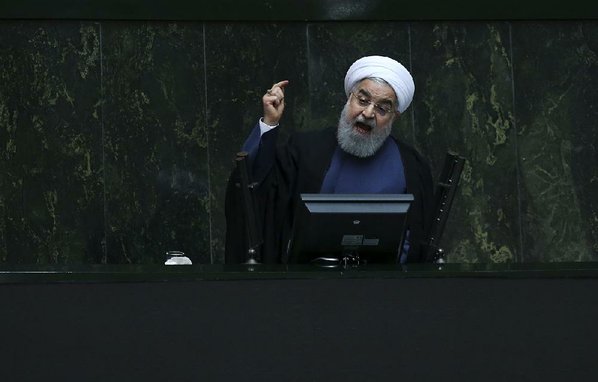
Their timing is everything and for the Iranian regime, the mullahs’ timing is becoming appallingly bad.
It seems that the halcyon days of 2015 when the Iran lobby was operating smoothly, and the Obama administration was busy giving away the store to appease Tehran and agree to a deeply flawed nuclear deal
After a bloody war in Syria that drained its treasury of all of the cold hard cash it got from the U.S. following the nuclear deal, the mullahs funded an overthrow of the government in Yemen and poured billions more into buying new arms and supplying terrorist groups and Shiite militias in Iraq fighting a bloody sectarian conflict.
Unfortunately for them, those decisions coincided with a dramatic global drop in oil prices as demand fell and U.S. oil production skyrocketed. The Iranian economy ground to a near halt as the value of its currency plummeted.
Inflation spread and dissatisfaction amongst the Iranian people rose steadily. Coupled with massive government fraud and corruption, things started to get worse for the mullahs.
Add a lingering drought turning once beautiful lakes into parched deserts due to environmental mismanagement and you begin to see the pattern of regime incompetence that has pushed the mullahs to the brink of forcing the very regime change they have fought so hard to oppose.
In true reactionary form, the mullahs have responded with near savage fury in cracking down on all forms of dissent no matter how seemingly innocuous. Regime security forces have arrested almost anyone engaged in any hint of protest, be it a woman waving a hijab, a businessman marching in the Grand Bazaar or a famer in a dusty village square.
Then the real hammer fell when Donald Trump was elected president and proceeded to focus intently on the Iranian regime and promptly fulfilled his campaign promise to pull out of the nuclear deal unless the regime changed its ways.
Now the beleaguered Iranian economy – controlled chiefly by the regime through the Revolutionary Guard Corps – is being hammered as waves of foreign companies pull out and Iranian oil exports grind to a near halt.
The effectiveness of the renewed economic sanctions has stunned the Iran lobby and surprised the mullahs as their hope in the European Union to defy the U.S. sanctions and keep an economic lifeline open to the regime ruling in Iran seems to be evaporating as quickly as water in the hot desert.
The political turmoil engulfing the regime’s leadership has produced some eye-opening moments unthinkable only a few years ago.
Hassan Rouhani, the hand-picked puppet of top mullah Ali Khamenei, was summoned before parliament for the first time as he bore the brunt of anger directed at a crisis spiraling out of control.
Among his most startling statement was “the economic problems are critical, but more important than that is that many people have lost their faith in the future of the Islamic Republic and are in doubt about its power.”
The admission was a stunning reflection on the power the mullahs have exerted over the last three decades and how it is loosening like it has never been loosened before.
The predicament facing the mullahs has even made Khamenei realize their initial hopes of rescue by Europe were seemingly dashed.
In his comments published on his official website Khamenei told Rouhani and his cabinet on Wednesday: “There is no problem with negotiations and keeping contact with the Europeans, but you should give up hope on them over economic issues or the nuclear deal.”
Khamenei told Rouhani and his cabinet to work “day and night” to solve the mounting economic problems which include the collapse of the rial currency and surging unemployment.
But at the same time, he appeared to call on parliament not to press too much on Rouhani who has been severely grilled over economic performance. Officials should unite against U.S. pressure, he said, since publicizing differences would only make the nation more unhappy according to Reuters.
In another sign of the desperate search for scapegoats, the parliament started impeachment proceedings against the education minister and moved to impeach the minister of industry, mines and business. This comes on the heels of sacking the finance and labor ministers.
At the rate the parliament is going, they might impeach Rouhani’s barber and driver next.
The worst may yet lie ahead as senior U.S. officials have said they aim to reduce Iranian regime’s oil exports to zero after the new round of sanctions in November.
Analysts with Oxford Economics issued a new report this week saying they expect U.S. imposed sanctions on Iran’s oil industry will “cripple” the Middle Eastern country’s economy after they take effect.
They expect the sanctions to send Iran’s economy into recession, predicting it will contract by 3.7 percent next year, “the worst performance in six years.”
Authors of the Oxford Economics report said it’s unlikely any efforts by other world powers can help Iran find a way to export oil.
“It now looks like the impact will be worse than we initially thought as the other signatories to the original deal have yet to spell out a clear strategy that would allow them to circumvent U.S. sanctions and continue importing Iranian oil,” wrote the report’s co-authors Mohamed Bardastani and Maya Senussi, who are senior economists with Oxford Economics.
Worse for the regime, any hope of a lifeline coming from Russia and China dimmed as both countries are faced with slowing economies and in the case of China, embroiled in its own trade and tariff war with the Trump administration.
Russia is already facing potential sanctions for its purported assassination attempt on a former spy and his daughter in Great Britain.
The final blows coming in November are aimed straight at the regime’s petrodollars.
“In June, Saudi
The stage is being set for the worst crisis ever to confront the mullahs and it may be their last.